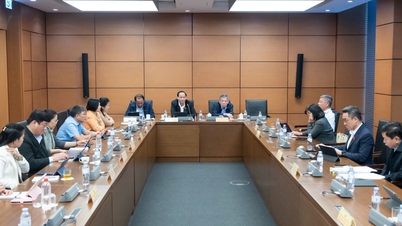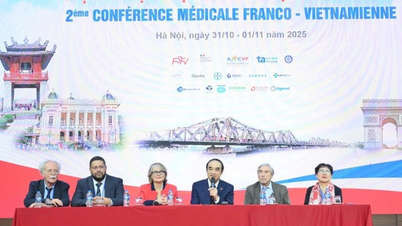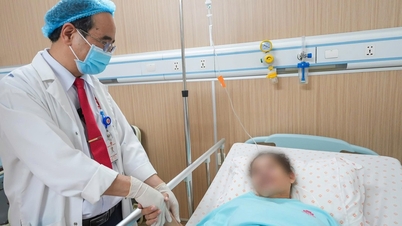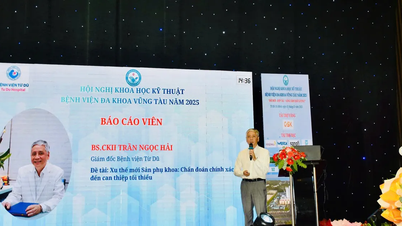On the morning of October 31, Thu Duc General Hospital organized the 8th Annual Scientific Conference, with the theme 'Application of science and technology and digital transformation in improving the quality of medical examination and treatment'.
The conference attracted more than 350 domestic and foreign medical experts, with 1 plenary session and 6 parallel thematic sessions, along with more than 60 in-depth reports from experts and doctors in internal medicine, surgery, clinical psychology... In addition to traditional topics, this year's conference introduced many advanced topics, the most prominent of which was "Application of AI in medicine".

Dr. Vu Tri Thanh, Party Secretary and Director of Thu Duc General Hospital, spoke at the conference.
PHOTO: BVCC
Towards “smart hospital”
The Smart Hospital model is a medical ecosystem that applies advanced digital technologies such as AI, Big Data, IoT and Cloud to optimize the entire operating process.
Dr. Vu Tri Thanh, Party Secretary and Director of Thu Duc General Hospital, shared: “Building a smart hospital is not a project with an end point, but a process of continuous improvement. The ultimate goal of applying AI, big data or electronic medical records (EMR) is the safety and health of patients, the satisfaction of medical staff when their hands are freed from administrative work to focus on the noblest mission of saving people”.
It is known that up to now, Thu Duc General Hospital has deployed many artificial intelligence (AI) applications in professional activities and management. Notably, the AI system supports reading chest X-rays, AI virtual assistant in management, analysis and incident reporting. The hospital has also achieved 100% electronic medical records in both clinical and paraclinical, contributing to realizing the goal of "No paper - No waiting - No cash" in medical examination and treatment, to improve the patient experience.
Chronic kidney disease is being "overlooked"
At the Internal Medicine session, Dr. Huynh Ngoc Phuong Thao, University of Medicine and Pharmacy Hospital, Ho Chi Minh City, pointed out that chronic kidney disease is being "missed" in the early stages because screening is not performed routinely, especially in patients with glomerulonephritis, hypertension and diabetes - which account for up to 80% of the causes of kidney failure.
“Many young patients with underlying high blood pressure, when they come to see us, discover they have end-stage chronic kidney disease,” said Dr. Phuong Thao.
According to the Kidney Disease Improving Global Outcomes (KDIGO) 2024 guidelines, simultaneous assessment of glomerular filtration rate (eGFR) and albuminuria (uACR) is crucial for early detection of kidney damage, as albuminuria may appear even before eGFR declines. Increased regular screening for high-risk groups will help timely intervention, improve prognosis and quality of life for patients.

Professor - Doctor - Physician Truong Quang Binh emphasized that individualization in the treatment of hypertension will bring many benefits to patients.
PHOTO: BVCC
In addition, within the framework of the cardiovascular seminar, Professor - Doctor - Doctor Truong Quang Binh, University of Medicine and Pharmacy Hospital, Ho Chi Minh City, emphasized the importance of the strategy of "individualizing hypertension treatment based on comprehensive cardiovascular risk".
Mr. Binh said: "It is necessary to treat the disease in a person, not just treat a sick person", this is also the spirit of personalization in modern medicine. This approach not only helps to optimize the effectiveness of blood pressure control but also predicts early cardiovascular risks in each individual, including those who have not yet shown symptoms of the disease.
Source: https://thanhnien.vn/nhieu-nguoi-tre-tang-huet-ap-den-kham-phat-hien-bi-benh-than-giai-doan-cuoi-18525103121141796.htm



![[Photo] Prime Minister Pham Minh Chinh chairs the second meeting of the Steering Committee on private economic development.](https://vphoto.vietnam.vn/thumb/1200x675/vietnam/resource/IMAGE/2025/11/01/1762006716873_dsc-9145-jpg.webp)










































































































Comment (0)